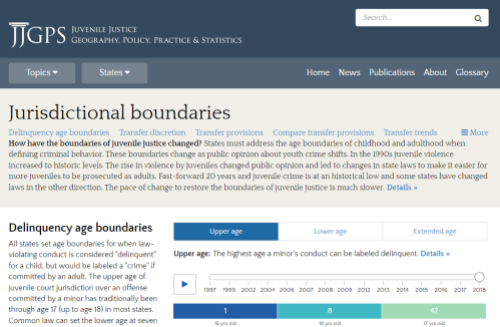All states set age boundaries separating a youth’s delinquent behavior from that which would be criminal if committed by an adult. Every state sets an upper age limit beyond which the juvenile justice court loses jurisdiction over new offenses, and criminal court jurisdiction commences. This upper age limit varies in each state, with most states selecting the 18th birthday as the boundary between delinquent and criminal conduct. States with upper age limits under 18 have passed legislation, spurred by advances in adolescent brain science and developmental research which highlighted the many differences between youth and adults, to increase the upper age. Some states have even considered upper age limits beyond the 18th birthday. All states have extended juvenile jurisdiction over youth who have been adjudicated delinquent on offenses committed while under juvenile jurisdiction. The purpose of extended jurisdiction, which is typically to age 21 but can extend to age 24 or higher in some states, is to enable continued correctional commitment or supervision beyond the upper age of jurisdiction. Some states also set a lower age limit, typically the 10th birthday, below which a child cannot be charged with a delinquency offense; however, most states do not specify a lower age in statute. For more details on the upper, lower, and extended juvenile court jurisdictions in each state visit http://www.jjgps.org/jurisdictional-boundaries.

The JUVENILE JUSTICE GUIDELINES recommends that all youth who have not yet turned 18 should be under the original jurisdiction of the juvenile justice court. The U.S. Supreme Court stated in Roper v. Simmons (2005): “In recognition of the comparative immaturity and irresponsibility of juveniles, almost every State prohibits those under 18 years of age from voting, serving on juries, or marrying without parental consent.” The U.S. Supreme Court, in a series of decisions, has acknowledged that youth are less culpable than adults due to differences in decision-making skills, ability to recognize risk, and forethought for future consequences and therefore deserve less punishment, signaling that adult punishments for youth are problematic.